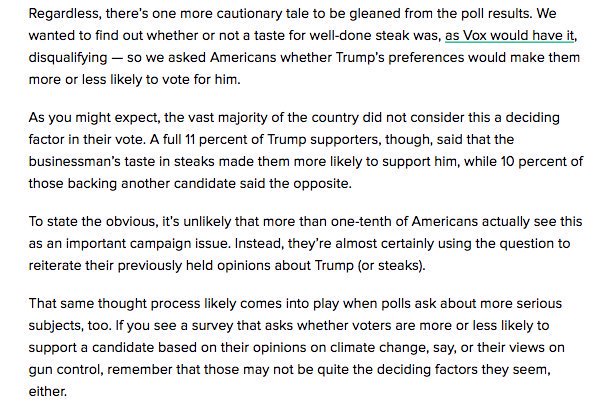Please indulge me as I take a minute today to complain about poll questions that ask people whether they& #39;d be more or less likely to vote for a candidate if the candidate did X thing.
Things people are generally bad at:
-explaining how they decide their votes
-entertaining counterfactuals
-understanding probability
This asks them to do all three!
-explaining how they decide their votes
-entertaining counterfactuals
-understanding probability
This asks them to do all three!
But the even bigger problem is that people aren& #39;t going to be answering the question as asked.
Like, say you find a person who& #39;s a die-hard Democrat. They still have Clinton bumper stickers. The chance they& #39;re voting for Trump again is zero.
Like, say you find a person who& #39;s a die-hard Democrat. They still have Clinton bumper stickers. The chance they& #39;re voting for Trump again is zero.
A pollster calls them up, and asks how...I don& #39;t know, Trump& #39;s hypothetical support for a bill to legalize kicking puppies would affect their vote.
Now....they weren& #39;t going to vote for him before, and they won& #39;t if he signs the law, so really it won& #39;t affect their vote at all. But that& #39;s not what they& #39;ll say.
They& #39;ll say it makes you less likely to vote for him, either to register their dislike of Trump, or their dislike of puppy-kicking, or both.
It& #39;s not that these questions can& #39;t be useful, especially if there are others for comparison, but I think it& #39;s generally a mistake to take the results at absolute face value.
Anyways, back to your regularly scheduled programming!
Anyways, back to your regularly scheduled programming!
A great demonstration of this principle in action -- most people who said hearings made them more likely to think Trump committed impeachable offenses *already believed that*, and vice versa. https://twitter.com/laurabronner/status/1308930285443125251">https://twitter.com/laurabron...

 Read on Twitter
Read on Twitter


